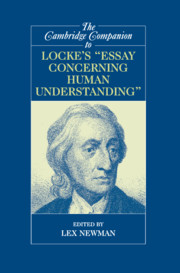Book contents
- Frontmatter
- Introduction
- 1 The Intellectual Setting and Aims of the Essay
- 2 Locke’s Polemic against Nativism
- 3 The Taxonomy of Ideas in Locke’s Essay
- 4 Locke’s Distinctions between Primary and Secondary Qualities
- 5 Power in Locke’s Essay
- 6 Locke on Substance
- 7 Locke on Ideas of Identity and Diversity
- 8 Locke on Ideas and Representation
- 9 Locke on Essences and Classification
- 10 Language, Meaning, and Mind in Locke’s Essay
- 11 Locke on Knowledge
- 12 Locke’s Ontology
- 13 The Moral Epistemology of Locke’s Essay
- 14 Locke on Judgment
- 15 Locke on Faith and Reason
- Bibliography
- Index of Names and Subjects
- Index of Passages Cited
6 - Locke on Substance
Published online by Cambridge University Press: 28 July 2007
- Frontmatter
- Introduction
- 1 The Intellectual Setting and Aims of the Essay
- 2 Locke’s Polemic against Nativism
- 3 The Taxonomy of Ideas in Locke’s Essay
- 4 Locke’s Distinctions between Primary and Secondary Qualities
- 5 Power in Locke’s Essay
- 6 Locke on Substance
- 7 Locke on Ideas of Identity and Diversity
- 8 Locke on Ideas and Representation
- 9 Locke on Essences and Classification
- 10 Language, Meaning, and Mind in Locke’s Essay
- 11 Locke on Knowledge
- 12 Locke’s Ontology
- 13 The Moral Epistemology of Locke’s Essay
- 14 Locke on Judgment
- 15 Locke on Faith and Reason
- Bibliography
- Index of Names and Subjects
- Index of Passages Cited
Summary
The category of substance is a venerable philosophical concept. It was the first and most fundamental of Aristotle's logical categories, and even though it underwent a bewildering set of changes as it came down through the later Scholastic tradition, and was often the subject of heated disputes between various metaphysical camps, it remained a concept of central importance even into the seventeenth century. Descartes, for example, needs the notion of substance (although he understood it quite differently from Aristotle and the tradition) to formulate his famous claim that the mind is a substance that is really distinct from the body, which is also a substance; and he makes central use of it as well in his cosmological argument for God's existence (where the dependence relations of modes on substances, and of finite substances on an infinite substance, are taken to correspond to “degrees of reality,” so that the ideas we have of these entities exhibit similar degrees of reality).
Corresponding to the foundational role the notion of substance plays in metaphysics, it enjoys epistemological priority as well. In the Aristotelian/Scholastic tradition, it is one of the first ideas of reason, and is a simple notion that is foundational to many of the more specific notions involved in the deductions of necessary truths that comprise scientia, the certain knowledge that we have of the world and the natural things within it. For Descartes, it is not so much the notion of substance as the notions of extended substance (which he equates with body) and thinking substance (which he equates with mind, or soul) that are clear and distinct, and which enable us to conceive minds and bodies as simple natures.
- Type
- Chapter
- Information
- Publisher: Cambridge University PressPrint publication year: 2007
- 6
- Cited by



